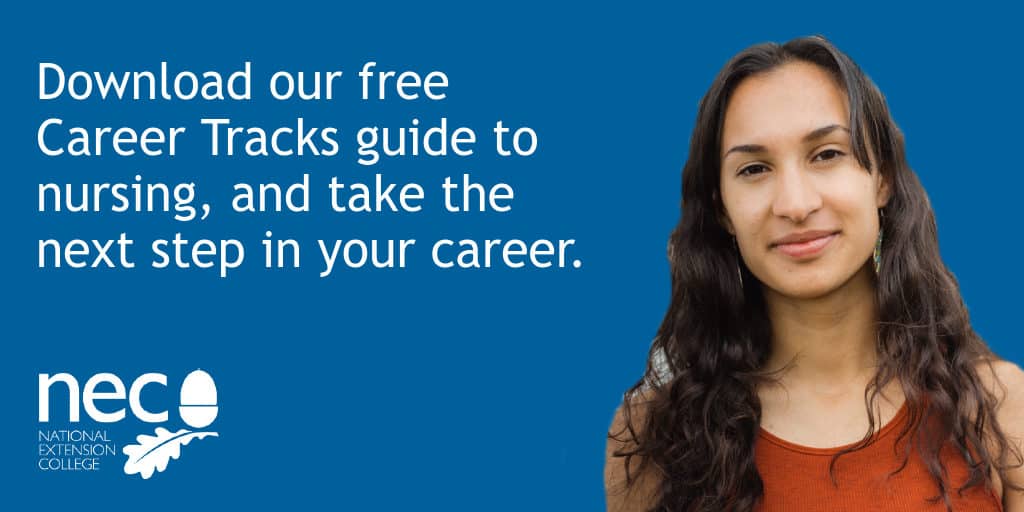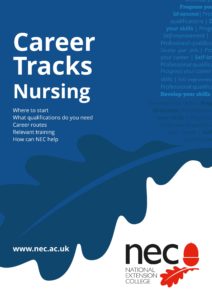Call free on: 0800 389 2839
Call free on: 0800 389 2839
Join in... The latest news and blogs from NEC
How do you become a nurse? Wednesday, 03 February 2021

If there has been anything positive to come out of the devastating events of the COVID-19 pandemic, it is perhaps the well deserved attention and appreciation given to front-line key workers and the National Health Service. The care and courage of NHS staff has been a true inspiration to us all, and has led many more people to consider entering into the profession.
In the first six months of 2020, applications for nursing degrees increased by 63% compared to the same period in the previous year. Many people are finding themselves either returning to nursing or wanting to change careers entirely during this time. If you have been inspired and are considering nursing but don’t know where to start, this blog should help you make that first step.
What qualifications do I need to get into nursing?
This is entirely dependent on your desired route.
In general, you will need:
- a genuine interest in healthcare,
- to be observant, organised and flexible,
- relevant work experience – volunteering, a work experience placement or being employed as a healthcare assistant,
- to be able to demonstrate evidence of literacy and numeracy skills.
Nursing degree
Duration: 3 years
To follow this route, you will typically need 5 GCSEs at grade 4 (C) or above, including English language or English literature, maths, and at least one science subject (usually biology). You will also need at least 2 A levels or a Level 3 BTEC qualification. Entry requirements differ between different universities so it is worth consulting UCAS or the university website.
Nursing degree apprenticeship
Duration: 4 years
This option enables you to continue working whilst studying towards your nursing qualifications. It is a newer qualification so there are fewer places available so it is worth checking the NHS jobs website. Applicants’ numeracy and literacy skills are assessed by the Nursing and Midwifery Council Approved Education Institution, aiming for a minimum Level 2 skill level.
Nursing associate apprenticeship
Duration: 2 years
Nursing associates bridge the gap between healthcare support workers and fully qualified nurses. Their role focuses on patient care. Nursing associate apprenticeships generally last for two years and consist of academic learning one day a week and work-based learning in a specific healthcare setting the rest of the week. To become a nursing associate apprentice you’ll need GCSE maths grade 4 (grade C) or above and GCSE English grade 4 (grade C) or above, or Functional Skills Level 2 in maths and English.
Nursing funding
In January 2020, the UK government announced the introduction of an NHS bursary benefiting those studying midwifery, nursing and other allied healthcare professions. All students studying courses in relevant professions, from September 2020, will receive at least £5,000 a year to help cover living expenses. This is not a loan so will not have to be paid back. There is also further funding available for those studying specific disciplines and these bursaries do not exempt you from Student Finance loans.
Leave a Reply Cancel reply
More stories
Study Tips
Student Stories
- Homeschooler Andrew’s experience of studying IGCSE Chemistry
- Mia’s NEC experience and her pursuit of knowledge
- Andrew’s experience: How homeschooling helps balance education and family commitments
- How homeschooling is helping Amelia work towards a medical career
- Distance learning as a mature student working abroad: Chun’s Experience
Results Day
Policy and Campaigns
- Five study bursaries for state sector teachers to take online A level Classical Civilisation offered by The Classical Association
- University of Cambridge Institute of Continuing Education offers tuition fee bursary for NEC A level students
- Rapid change and the need to upskill and reskill means more of us are likely to be second-chance learners
- How NEC Considers Web Accessibility for Students
- Embracing Distance Learning: A Path to Inclusive Education and Lifelong Learning



Add a new comment
Current comments: 0